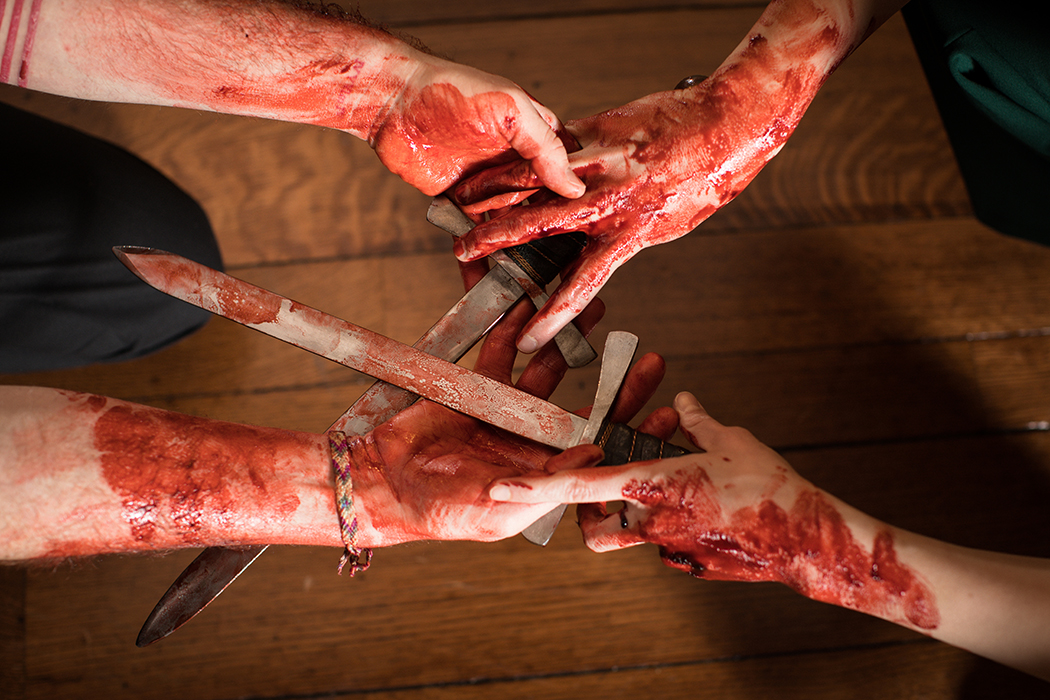To a lay audience member who hasn’t been involved in a theater production since fifth grade, directors seem as essential to any play’s success as a script. They’re the boss of the show. If the director goes into a coma at the start of the first rehearsal or has a crisis and runs off with the box office manager, what sharp-eyed, astute-eared taskmaster keeps everyone and everything in line?
During the annual Actors’ Renaissance winter season at Staunton’s American Shakespeare Center, it’s completely up to the players to get their proverbial acts together.
It’s no small challenge. Roughly 13 actors are responsible for 79 roles through the course of four plays: darkly hilarious Early Modern true crime bonanza Arden of Faversham; Amy E. Witting’s new piece Anne Page Hates Fun; Shakespeare’s domestic sitcom The Merry Wives of Windsor; and the revered second installment of his historical tetralogy, Henry IV, Part 1.
On the well-lit stage of the enchanting Blackfriars Playhouse last month, the acting company previewed their work on Henry IV, Part 1. The January 24 debut performance revealed completely actor-made choices on staging—down to the costume design, music, props, and the minutiae that would otherwise fall under a director’s purview. And on top of that, the actors had learned their lines in under 10 days.
Why suffer so? According to the ASC, the yearly test aims to empower the players by giving them the “unique blend of scholarship and practice” necessary for undertaking the “deepest dive into the Elizabethan era.” And despite the potential for chaos, it syncs perfectly with the ASC’s respectful and historically guided approach.
The result of leaving the direction of Henry IV, Part 1 to those performing in it is not unlike the best kind of self-released punk rock record: rolling on a steady current of gross humor, powered by blasts of lusty rage, true to the intent of those involved, and peppered with thrilling, unexpected turns. Performances hit the pinnacle of emotive perfection or, in some cases, sail just beyond the well-intentioned grasp of those outsized by their desire to execute.
The script follows King Henry Bolingbroke’s mounting tensions with a rebel alliance fueled by hotheaded Hotspur, and tackles the monarch’s estranged relationship with his heir, Hal the Prince of Wales. After Hal grows out of his frivolous London tavern lifestyle—and tomfoolery with his scene-stealing, boozehound buddy Sir John Falstaff—the young noble assumes his rightful place at his father’s side. Together, Hal and King Henry lead an army that puts down the upstarts seeking to overthrow the crown.
While the play is named after the highest rung on the hierarchy, it could easily bear the name of any of the aforementioned key roles, as each has more to say than the titular character. Yet in reenacting this embattled royal, David Anthony Lewis commands the performance with resonant authority and manly poise. Instinctive, unstudied, and wholly convincing, he seems more comfortable with Shakespeare’s words than anyone else in the play. If some of the production’s choices skirt the border of questionable interpretation, there is zero doubt in Lewis’ Henry.
Henry’s problematic princely son is played with a cautious focus by Brandon Carter, who became more at ease as his character grew fully self-aware in the play’s latter half. It’s possible that Carter’s smooth-voiced delivery is marked by tentative restraint since he’s sharing many scenes with the comedic bulldozer and big-bellied bravado of John Harrell’s Falstaff. The latter’s costume choices paint Sir John as a ’90s grunge wash-up, complete with bandana, Nirvana tee, combat boots, and requisite plaid shirt—tucked over a fat-suit paunch. Despite being a bit young and thin in the limbs for the lovable drunk liar, Harrell is appropriately slurry, sloppy, cowardly, and as hysterical as anyone could hope.
Another of the King’s major headaches, rebel leader Hotspur, is set afire with an irrepressible rage by KP Powell. Cocksure and indignant, the charismatic Powell only relents from boiling over when he’s in the lap of coquettish Lady Percy; as played by Abbi Hawk, she charmingly presents Hotspur’s wife as sultry and impossibly headstrong. Powell and Hawk display authentic chemistry during the play’s few romantic moments.
But as Henry IV, Part 1 is built on barroom banter and war, zingers and vengeful aggression frame Prince Hal’s journey from loaf to promising successor; ultimately, the Actors’ Renaissance finds its best staging choices in the slapstick of the tavern and botched vaudevillian thieveries. Putting the full Blackfriar’s space to excellent use, the actors hurdle the seats, scramble up the aisles to escape the stage, and Hal even chugs from a beer bong hanging off of the second-floor balcony. And though the too- careful, slo-mo choreography of the final act’s sword fighting could use tightening up, the group prevailed thanks to its nimble humor, righteous ire, and genuinely poignant performances.
____________________________________________________________________________
Henry IV, Part 1
American Shakespeare Center
Through April 13









